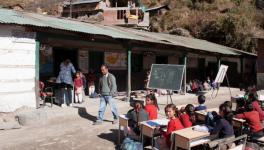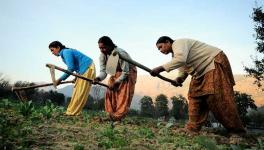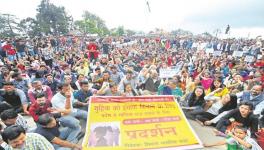Himachal: Knitting Their way to Self-Empowerment, Lahauli Style
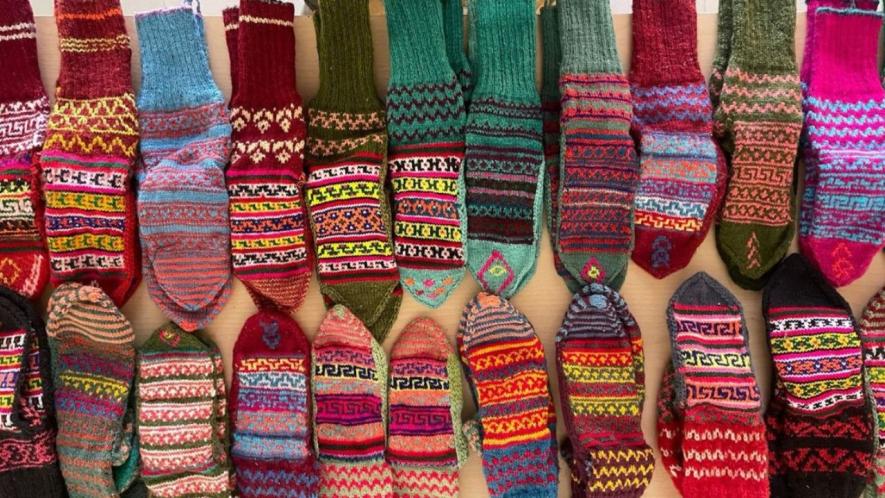
Pairs of socks knitted by the women (Photo - Rohit Prashar, 101Reporters)
Lahaul-Spiti, Himachal Pradesh: Tholang village in Lahaul-Spiti tribal district of Himachal Pradesh remains covered in snow for half the year. There is only one cropping season and severe cold restricts people’s activities for the remaining six months, but not Shanti Devi (55) and other women who are busy knitting socks.
“I have been doing this for four decades. It was just a hobby in the beginning. However, when I sensed the demand, I started selling them in the local market,” says Shanti.
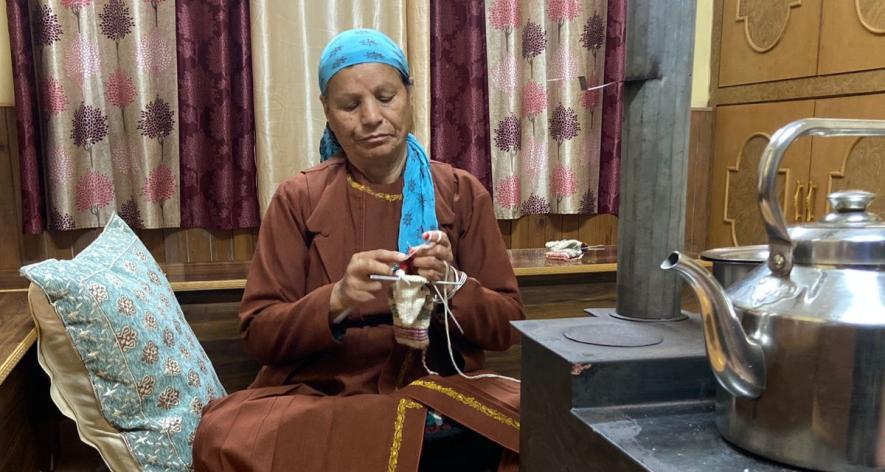
Shanti devi knitting socks (Photo - Rohit Prashar, 101Reporters).
Lahaul socks are made from the wool of sheep reared at home. Thousands of women in the district, who earlier worked in their own farms, have been moving towards economic prosperity by putting to use the traditional knowledge of knitting passed on through generations. The interest of consumers has increased after Lahaul socks received the Geographical Indications (GI) tag in 2021.
The activity has brought women together to form self-help knitting groups comprising 10 to 25 women under the guidance of Panchayati Raj Department. The women of Tholang's Ghepan Mahila Mandal, which includes Shanti, even visited Bhutan two months ago to introduce their socks, which the shopkeepers were ready to buy.
“In Bhutan, we sold 50 pairs of socks for Rs 300 each. We also talked about staying in touch with these shopkeepers. They have asked us to courier the goods,” said Palmo Shashani, president, Ghepan Mahila Mandal.
The opening of Atal Tunnel in 2020 also increased tourism potential of the area, which was earlier unmotorable from November to April due to heavy snowfall. With the tunnel built in the Pir Panjal Range connecting Lahaul Valley to the rest of the world, lakhs of tourists come to Lahaul region during the winters these days.
According to the women of Tholang, before 2020, they used to send their hand-knit socks for sale outside the district. After the tunnel opened, they have been selling them in local shops, dhabas (roadside eateries) and hotels. Shanti said her sales doubled after the tunnel opened. “Earlier, we used to send the socks knitted in winters to Kullu and Manali for sale in the summers. Now, we can sell them in the winters itself.”
“We set up stalls on roadsides in places of tourist attraction. Our socks are a great relief to the tourists who visit the cold valleys of Lahaul. They keep the visitors warm,” said Dev Dasi, adding that the women are not only buying essential items for their homes but also purchasing expensive modern electronic equipment with the income generated.
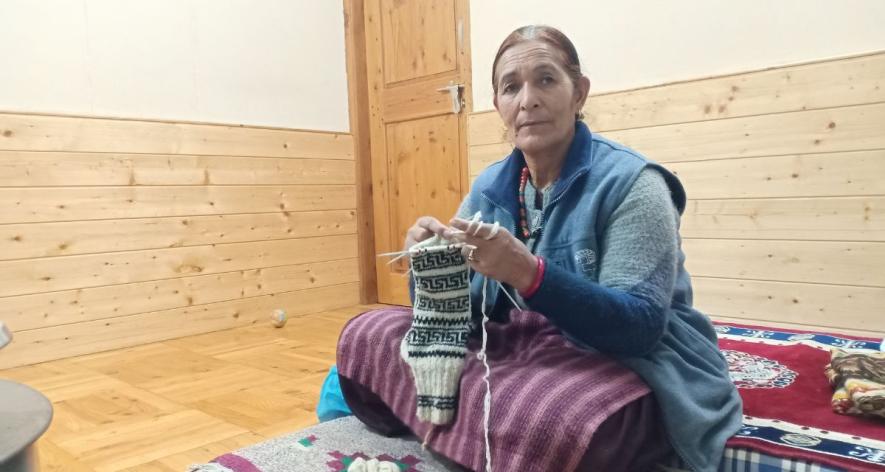
Lahauli woman weaving Lahauli socks (Photo - Rohit Prashar, 101Reporters).
“A woman knitting socks earns Rs 4,000 to 5,000 per month. I am merchandising them in my hotel as well,” said Dev Dasi, who is also the owner of Sukh Lodge Homestay.
Akshita Sharma, design consultant, Himachal Pradesh State Handicrafts and Handloom Corporation Limited, said the business volume of socks cannot be estimated since the women mostly sell them locally. "In India, warm socks are necessary only in winters. Summers is a lean period for this business. However, the government is looking at ways to explore the demand in European countries," Sharma said.
Vikram Katoch, president, Save Lahaul Spiti Society, has been instrumental in getting GI tag for Lahaul socks by doing the necessary documentation. “Right now, the society is promoting Lahaul socks at several trade fairs and exhibitions. We are building an online platform to sell socks," he said.
Besides economic empowerment, Lahaul socks have been unravelling travel opportunities before these women artisans. “We get a chance to display our products in new places, both tourist and religious places. We have made group travels to Dharamshala, Beed in Maharashtra and Bhutan. I have been to Gaya and Arunachal Pradesh, too. The best part is we do not have to take money from the family for these trips,” Anju Devi (45), a socks weaver from Lahaul, told 101Reporters.
Appreciating the work of women like her, the handicrafts and handloom corporation promotes their products in its exhibitions and fairs held across the country. This way, it tries to improve the market visibility of the GI-tagged Lahaul socks as well. Further efforts are on to make these products available on online platforms like Amazon.
The state government organises free training camps to teach new designs to the artisans. They are taken to various fairs and exhibitions and their products are widely publicised. When women travel to attend the corporation's fairs, the government covers their travel expenses. The entire proceeds from such sales also go to these women.
Sheela Devi, a member of Madgran Mahila Mandal, said sweaters or full body clothes are made using knitting machines, whereas it is easier to make socks by hand itself. A weaving machine costs Rs 10,000 to 15,000, but the government does not provide a subsidy for it. "Out of the 25 women in our group, four have machines," she said.
Handmade products have even designs and are more durable, while some variations in design can be noted in machine-made socks. Santosh Kumari (40), a member of Madgran Mahila Mandal, said they also help each other by sharing new designs from time to time. “New designs are always in good demand in shops… If someone orders in bulk, all of us sit together and make them,” she said.
(Rohit Prashar is a Himachal Pradesh-based freelance journalist and a member of 101Reporters, a pan-India network of grassroots reporters.)
Get the latest reports & analysis with people's perspective on Protests, movements & deep analytical videos, discussions of the current affairs in your Telegram app. Subscribe to NewsClick's Telegram channel & get Real-Time updates on stories, as they get published on our website.














